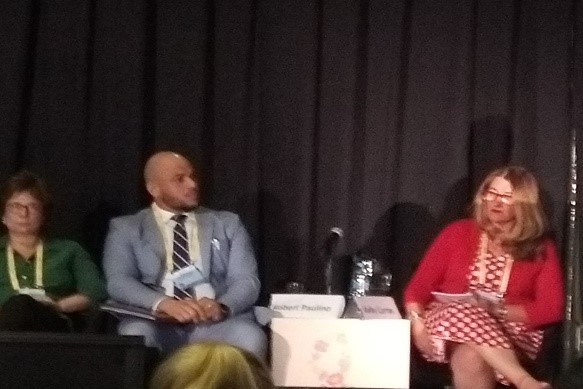
Dominican Republic piloted Pre-Exposure Prophylaxis (PrEP)
Image: Dr Robert Paulino-Ramirez (centre)
Director of the Institute for Tropical Medicine and Global Health at Universidad Iberoamericana (UNIBE), Dr Robert Paulino-Ramirez, presented on the Dominican Republic’s experience of piloting Pre-Exposure Prophylaxis (PrEP). Dr Paulino-Ramirez made his presentation during the session titled, ‘It’s time for PrEP in Latin America and the Caribbean’ at the 10th International AIDS Society Conference on HIV Science which is being held in Mexico City, Mexico from 20-24 July. Following an 18-month pilot, PrEP implementation is being expanded from 15 July 2019 to two extra sites. Of the 849 persons who were assessed for PrEP, 32 percent (271) started. Acceptability was high among persons targeted. Dr Paulino-Ramirez emphasized the importance of mental health interventions and behaviour change modifications in the delivery of PrEP. The pilot was a collaborative effort by the Ministry of Public Health, DIGECITSS (Dirección General de Control de Infecciones de Transmisión Sexual y VIH/SIDA [Division for Controlling STIs and HIV], PAHO and UNIBE.
Director of PANCAP, Mr Dereck Springer, in an intervention from the floor, shared that The Bahamas and Barbados had led the Caribbean in implementing PrEP. Mr Springer informed the audience that PANCAP, with funding from the Global Fund, had convened a PrEP Share Fair on 16-17 July in Barbados. Eleven countries participated in the event and had the opportunity to learn from The Bahamas and Barbados’ experience through interactive presentations, site visits and stories from clients who are receiving PrEP. He explained that countries also developed action plans, identified support needs and committed to advocating for PrEP’s implementation. The Caribbean is therefore poised to accelerate implementation.
WHAT IS PANCAP?
PANCAP is a Caribbean regional partnership of governments, regional civil society organisations, regional institutions and organisations, bilateral and multilateral agencies and contributing donor partners established on 14 February 2001. PANCAP provides a structured and unified approach to the Caribbean’s response to the HIV epidemic, and coordinates the response through the Caribbean Regional Strategic Framework on HIV and AIDS to maximise efficient use of resources and increase impact, mobilise resources and build the capacity of partners.
What are the Global AIDS Strategy 2021–2026 targets and commitments?
If targets and commitments in the strategy are achieved:
- The number of people who newly acquire HIV will decrease from 1.7 million in 2019 to less than 370 000 by 2025
- The number of people dying from AIDS-related illnesses will decrease from 690 000 in 2019 to less than 250 000 in 2025.
- The goal of eliminating new HIV infections among children will see the number of new HIV infections drop from 150,000 in 2019 to less than 22,000 in 2025.
What are the 95-95-95 Targets for ending AIDS?
- 95% of People Living with HIV know their HIV status;
- 95% of people who know their status on treatment; and
- 95% of people on treatment with suppressed viral loads.
HELPFUL LINKS:
Global AIDS Strategy 2021–2026, End Inequalities, End AIDS
https://pancap.org/pancap-documents/global-aids-strategy-2021-2026-end-inequalities-end-aids/
Caribbean Regional Strategic Framework on HIV and AIDS (CRSF) 2019-2025
https://pancap.org/pancap-documents/caribbean-regional-strategic-framework-2019-2025/
